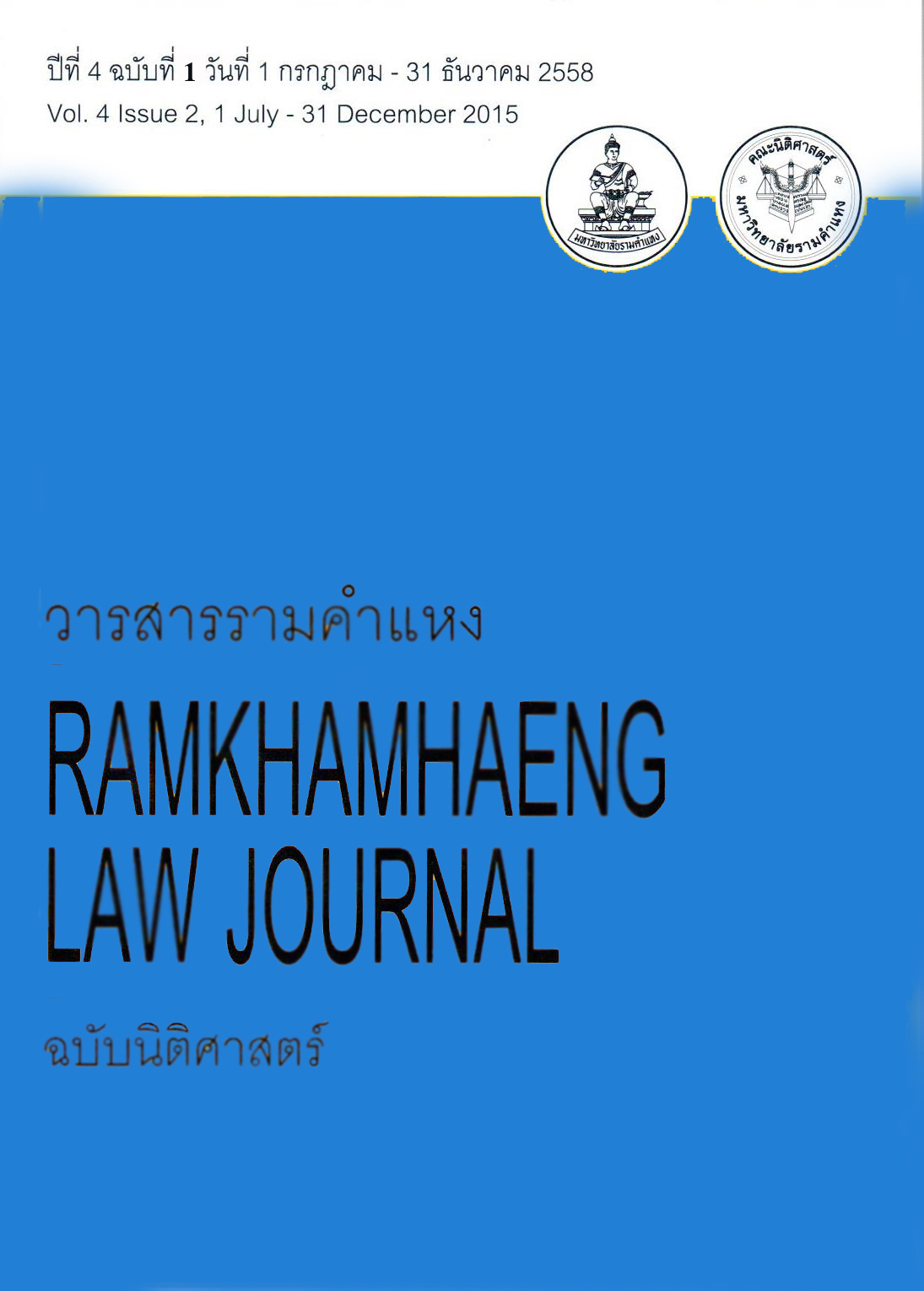ความรับผิดของผู้ถือหุ้นที่มีผลกระทบกับเจ้าหนี้ของบริษัทจำกัด
Main Article Content
Abstract
ประมวลกฎหมายแพ่งและพาณิชย์บัญญัติให้บริษัทเอกชนจำกัดเป็นนิติบุคคลและให้ผู้ถือหุ้น จำกัด ความรับผิดโดยเคร่งครัด นอกจากนี้ยังไม่มีบทบัญญัติกำหนดจำนวนทุนจดทะเบียนขั้นตํ่าสำหรับ บริษัทเอกชนจำกัดที่ประกอบธุรกิจโดยทั่วไป จึงทำให้ผู้ถือหุ้นสามารถตั้งบริษัทเอกชนจำกัดโดยมีทุน จดทะเบียนตํ่าและประกอบธุรกิจที่มีมูลหนี้สูงกว่าทุนจดทะเบียน ส่งผลให้เจ้าหนี้ของบริษัทเอกชน จำกัดได้รับความเสียหายต่างกับกฎหมายบริษัทเอกชนจำกัดและกฎหมายล้มละลายของประเทศอังกฤษ และประเทศสหรัฐอเมริกา กฎหมายบริษัทเอกชนจำกัดของประเทศสาธารณรัฐประชาชนจีน ประเทศ ออสเตรเลีย และประเทศสาธารณรัฐสิงคโปร์ ที่ใช้หลักการไม่คำนึงถึงความเป็นนิติบุคคลเรียกให้ผู้ถือหุ้น ที่ตั้งบริษัทเอกชนจำกัดโดยมีทุนจดทะเบียนตํ่าเข้าร่วมรับผิดในหนี้ของบริษัทเอกชนจำกัดเพื่อคุ้มครอง เจ้าหนี้ในคดีแพ่ง ในการชำระบัญชี และในคดีล้มละลาย นอกจากนี้ยังให้อำนาจศาลในการสั่งเลิกบริษัท เอกชนจำกัด ในกรณีที่บริษัทเอกชนจำกัดไม่สามารถชำระหนี้ได้หรือเพื่อประโยชน์แห่งความยุติธรรม อีกทั้งกฎหมายบริษัทเอกชนจำกัดของประเทศอังกฤษและประเทศสาธารณรัฐสิงคโปร์ยังให้อำนาจ รัฐมนตรีตีพิมพ์รายงานการตรวจบริษัทเอกชนจำกัด เพื่อคุ้มครองเจ้าหนี้ของบริษัทเอกชนจำกัด อีกด้วย ดังนั้นผู้ศึกษาจึงได้เสนอแนะว่า ควรแก้ไขเพิ่มเติมประมวลกฎหมายแพ่งและพาณิชย์ และพระราชบัญญัติล้มละลาย พุทธศักราช 2483 โดยให้ผู้ถือหุ้นมีความรับผิดในหนี้ของบริษัทเอกชน จำกัด เพื่อคุ้มครองเจ้าหนี้ของบริษัทเอกชนจำกัดจากกรณีที่ผู้ถือหุ้นตั้งบริษัทเอกชนจำกัดขึ้นโดยมี ทุนจดทะเบียนตํ่า
Liabilities of Shareholders Affecting Creditors of Limited Private Company
The Civil and Commercial Code stipulates that limited private companies are juristic persons and that shareholder liability is strictly limited. In addition, there are no provisions determining the minimum amount of authorized capital required for limited private companies conducting general business. As such, shareholders can establish limited private companies with a low amount of authorized capital and conduct business while incurring obligations at a higher level than is the case with those having larger amounts of authorized capital. This results in creditors of limited private companies being damaged. This differs from the laws governing limited private companies and the bankruptcy laws of the UK and the USA, in addition to the laws regulating limited private companies in the legal systems of the PRC, Australia and Singapore. These countries do not use the concept of “juristic person” as applied to shareholders setting up limited private companies. Instead, they have laws involving authorized capital for private limited companies which ensure the assumption of liability and the fulfi llment of obligations such that the interests of creditors are protected in respect to civil suits, liquidations and bankruptcy cases. In addition, in these jurisdictions, courts have the authority to force terminations of the operations of limited private companies in cases in which they are unable to repay debts and to see that justice is rendered. The laws governing limited private companies in the UK and Singapore also authorize ministers to publish reports of investigations of limited private companies so as to protect creditors.
The researcher therefore recommends that the Civil and Commercial Code and the Bankruptcy Act, B.E. 2483 (1940) be amended. These amendments should stipulate that shareholders of limited private companies must be obliged to assume liability in order to protect the creditors of limited private companies in cases in which shareholders establish limited private companies with a low amount of authorized capital.

